Unit 2 How often do you exercise? SectionB 2A-2E课件 (共30张PPT)
文档属性
| 名称 | Unit 2 How often do you exercise? SectionB 2A-2E课件 (共30张PPT) |  | |
| 格式 | zip | ||
| 文件大小 | 2.8MB | ||
| 资源类型 | 教案 | ||
| 版本资源 | 人教新目标(Go for it)版 | ||
| 科目 | 英语 | ||
| 更新时间 | 2022-09-13 17:56:20 | ||
图片预览

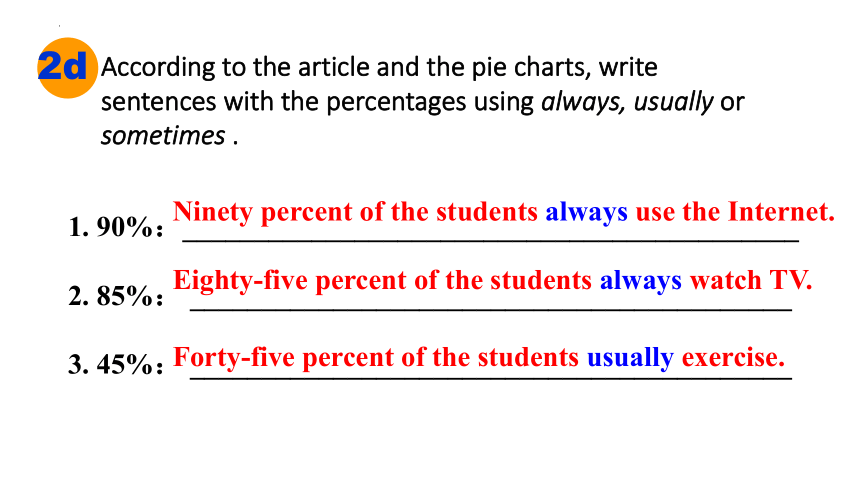
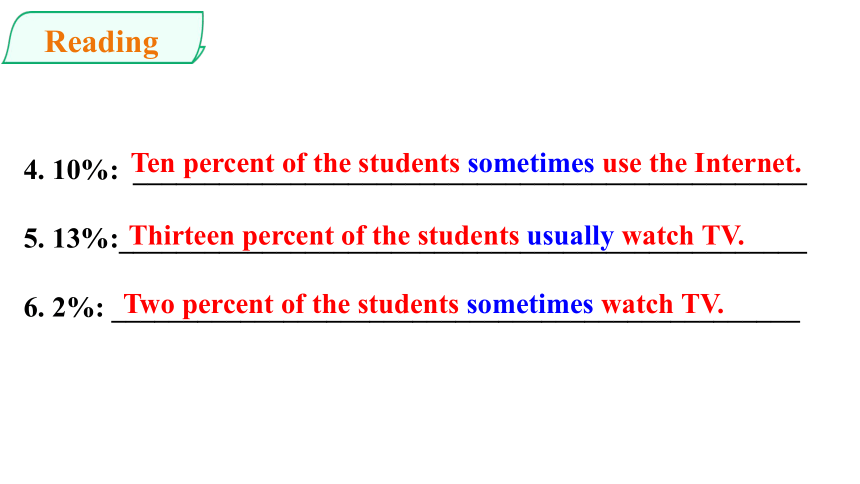
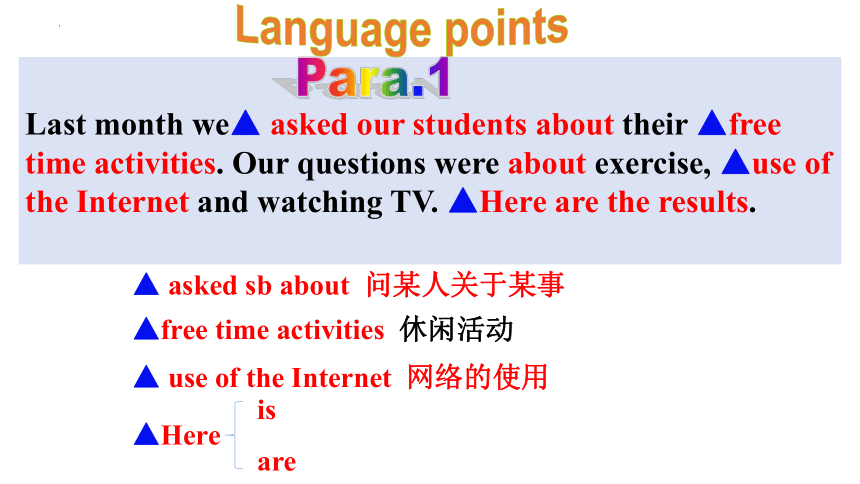
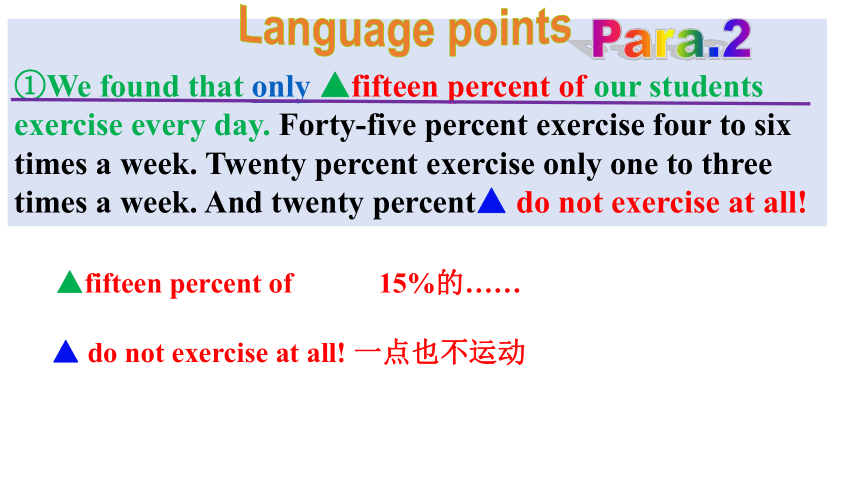
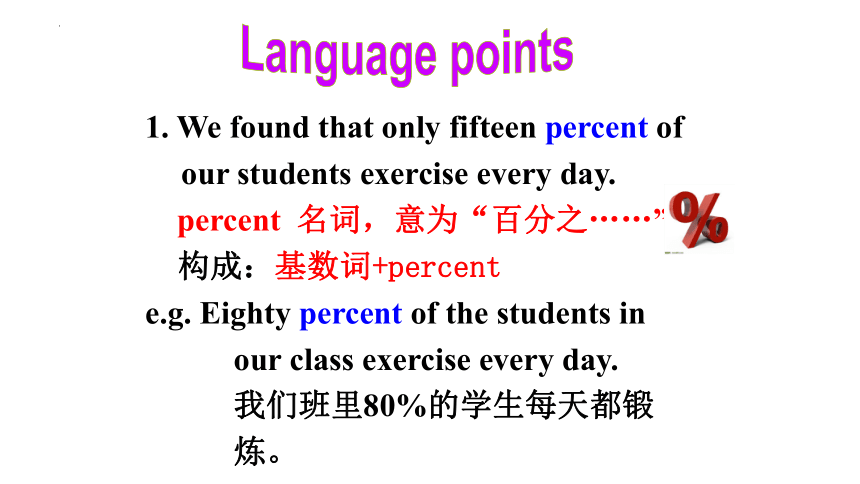

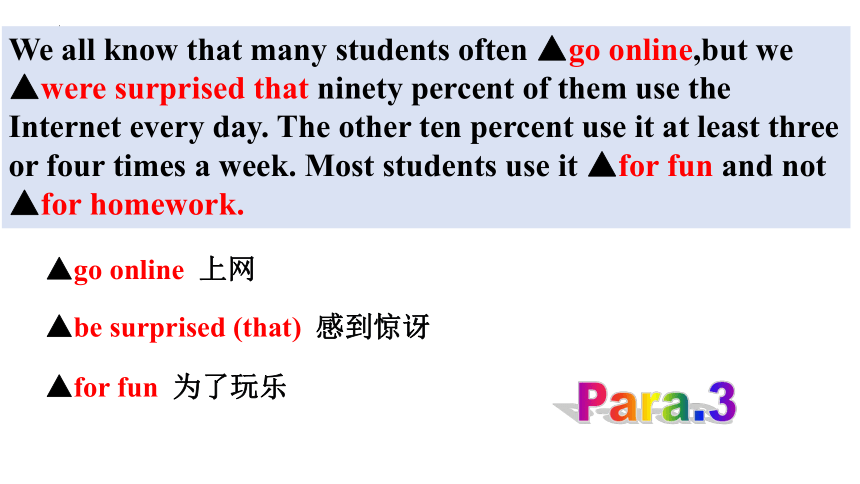
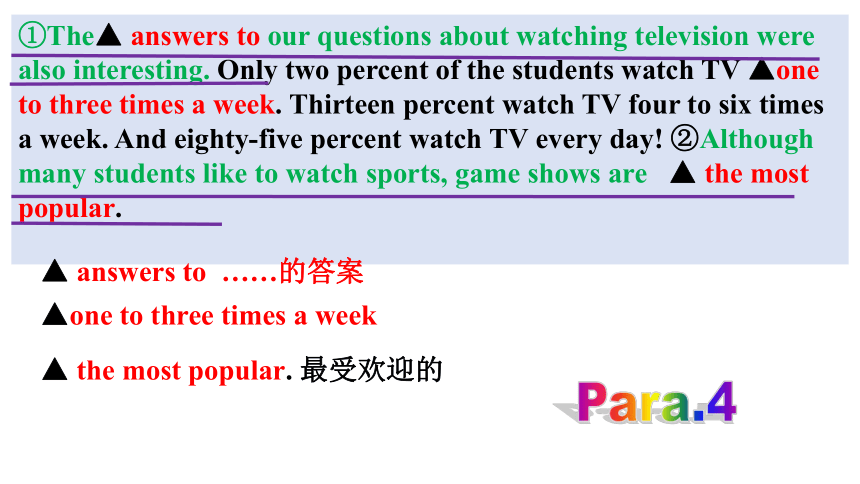
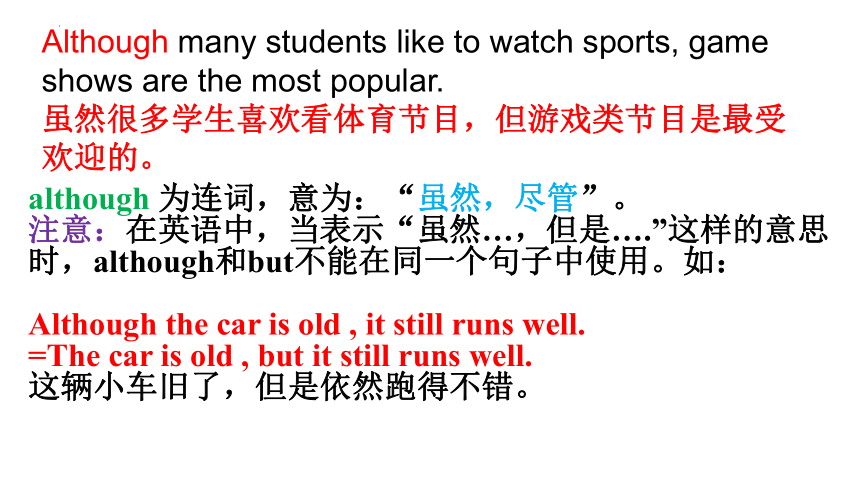
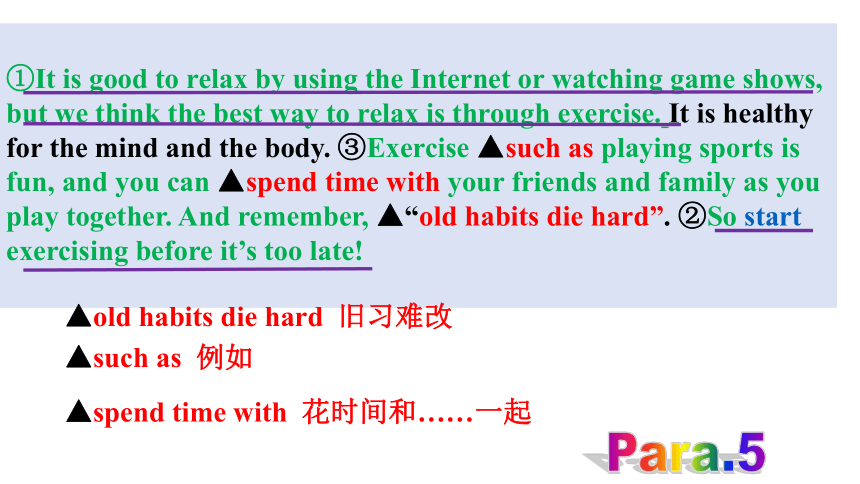
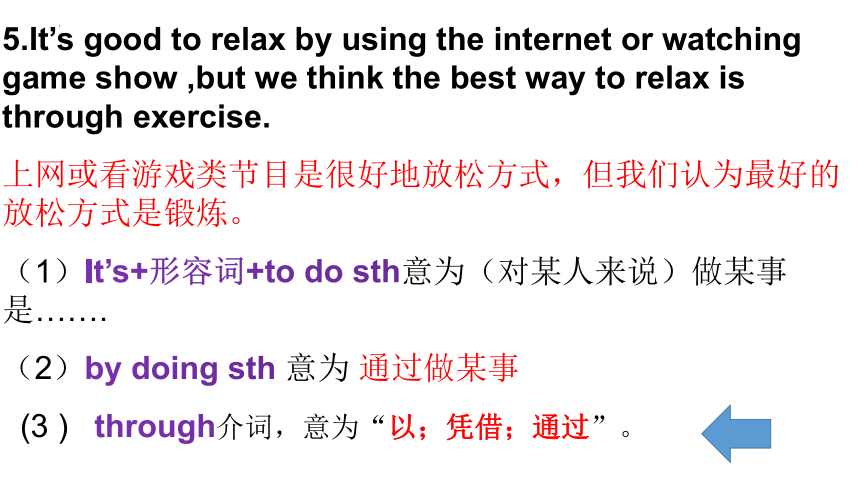
文档简介
(共30张PPT)
Unit 2
How often do you exercise
Section B(2a-2e)
2d
According to the article and the pie charts, write sentences with the percentages using always, usually or sometimes .
1. 90%:___________________________________________
2. 85%: __________________________________________
3. 45%: __________________________________________
Eighty-five percent of the students always watch TV.
Ninety percent of the students always use the Internet.
Forty-five percent of the students usually exercise.
4. 10%: _______________________________________________
5. 13%:________________________________________________ 6. 2%: ________________________________________________
Ten percent of the students sometimes use the Internet.
Thirteen percent of the students usually watch TV.
Two percent of the students sometimes watch TV.
Reading
Last month we▲ asked our students about their ▲free time activities. Our questions were about exercise, ▲use of the Internet and watching TV. ▲Here are the results.
Language points
▲ asked sb about 问某人关于某事
▲free time activities 休闲活动
▲ use of the Internet 网络的使用
▲Here
Para.1
is
are
①We found that only ▲fifteen percent of our students exercise every day. Forty-five percent exercise four to six times a week. Twenty percent exercise only one to three times a week. And twenty percent▲ do not exercise at all!
Language points
▲ do not exercise at all! 一点也不运动
▲fifteen percent of 15%的……
Para.2
Language points
1. We found that only fifteen percent of our students exercise every day.
percent 名词,意为“百分之……”
构成:基数词+percent
e.g. Eighty percent of the students in
our class exercise every day.
我们班里80%的学生每天都锻
炼。
【注意】
percent做主语时,谓语动词的数要根据其后面的名词来确定。
e.g. Fifty percent of the apples ______ bad.
50%的苹果都坏了。
Twenty percent of the meat_____ in the fridge.
20%的肉都在冰箱。
are
is
We all know that many students often ▲go online,but we ▲were surprised that ninety percent of them use the Internet every day. The other ten percent use it at least three or four times a week. Most students use it ▲for fun and not ▲for homework.
Para.3
▲go online 上网
▲be surprised (that) 感到惊讶
▲for fun 为了玩乐
①The▲ answers to our questions about watching television were also interesting. Only two percent of the students watch TV ▲one to three times a week. Thirteen percent watch TV four to six times a week. And eighty-five percent watch TV every day! ②Although many students like to watch sports, game shows are ▲ the most popular.
▲ answers to ……的答案
▲one to three times a week
▲ the most popular. 最受欢迎的
Para.4
Although many students like to watch sports, game shows are the most popular.
虽然很多学生喜欢看体育节目,但游戏类节目是最受欢迎的。
although 为连词,意为:“虽然,尽管”。
注意:在英语中,当表示“虽然…,但是….”这样的意思时,although和but不能在同一个句子中使用。如:
Although the car is old , it still runs well.
=The car is old , but it still runs well.
这辆小车旧了,但是依然跑得不错。
①It is good to relax by using the Internet or watching game shows, but we think the best way to relax is through exercise. It is healthy for the mind and the body. ③Exercise ▲such as playing sports is fun, and you can ▲spend time with your friends and family as you play together. And remember, ▲“old habits die hard”. ②So start exercising before it’s too late!
▲old habits die hard 旧习难改
▲such as 例如
▲spend time with 花时间和……一起
Para.5
5.It’s good to relax by using the internet or watching game show ,but we think the best way to relax is through exercise.
上网或看游戏类节目是很好地放松方式,但我们认为最好的放松方式是锻炼。
(1)It’s+形容词+to do sth意为(对某人来说)做某事是…….
(2)by doing sth 意为 通过做某事
(3 ) through介词,意为“以;凭借;通过”。
6. Exercise such as playing sports is fun…
such as 意为“像……这样”,表示列举。
结构常为:名词+ such as + 例子
e.g. She likes animas such as rabbits
and birds.
她喜欢像兔子、小鸟这样的小动物。
注意:其后面不可列举出所有的事物。如:
我了解四种语言,例如英语、汉语。
I know four language, such as, English and Chinese. (√)
I know four language, such as, English, French, Japanese and Chinese. (×)
7.Exercise such as playing sports is fun ,and you can spend time with your friends and family as you play together.
比如进行体育活动这方面的锻炼时有趣的,当你们一起活动的时候你可以和朋友、家人一起度过美好的时光。
spend…..with sb意为与某人度过…….
【拓展】spend……(in)doing sth.花费时间或金钱做某事。
He always spends his time playing soccer.
8. So start exercising before it’s too late!
所以赶紧锻炼起来,不要等到来不及了。
It’s too late 字面意思为“为时太晚,来不及了”
是英语的一个常用表达。如:
Now you know you are wrong , but it’s too late.
你现在知道错了,已经太晚了。
句中, It’s too late 与before共同组成从句,
表示“不要等到为时已晚;不要等到来不及的时候;
趁还来的及”。如:
You should work harder before it’s too late to catch up.
你现在用功还赶得上( catch up)。
Take the health pare your results with your partner’s. Who’s healthier
武汉启智文化传媒
4
be smart about(doing)sth.
聪明地对待…;对…精明。
Are you healthy
1. Complete the chart with activities you do and don’t do.
What about your mother / father
always usually often sometimes hardly ever never
I
My mother or father
play basketball
play chess
read books
read newspapers
eat hamburgers
eat chicken
drink juice
drink tea
watch TV
use the Internet
stay up late
get up early
Practice!
5. I hardly ever watch TV.
1. I always play basketball after school.
2. My father always plays chess on weekends.
3. I usually read books on weekends.
4. My father sometimes drinks tea.
Writing
6. My father never gets up early.
2. Write five sentences using the information above.
3. Fill in the blanks in the conversation.
A: What do Tom and Mike ______ do on weekends
B: They sometimes go to the museum.
A: _________ do they go to the shopping center
B: ______ ever. Maybe about twice a month.
A: _________ do they watch TV
B: Mike never watches TV, but Tom watches TV _____ day.
A: Oh, I’m just like Tom. I ______ watch TV, too.
usually
How often
Hardly
How often
every
always
1.一点也不
2.上网
3.感到惊讶
4.尽管
5.20%
6.休闲活动
7.最受欢迎的
8.三到六次
9.为玩乐/为家庭作业
10.旧习难改
11.对身心有好处
the most popular…
not at all…
go online …
be surprised…
although
twenty percent…
free time activities…
three to six times
for fun/for homework…
Summary
old habits die hard…
be good for the mind and the body…
1. The old man ________(锻炼)
every morning.
2. I often _______ (购物) on weekends.
3. We must _______ (保持 ) our classroom
clean.
4. There are some ___________(不同)
between the two pictures.
I. Fill in the blanks.
exercises
shop
keep
differences
Exercises
5. He ____________ (几乎不) goes to a
restaurant for dinner.
6. Katrina doesn't often _______ (喝)
coffee, she likes green tea.
7. My eating _________(习惯) are not
very good.
hardly ever
drink
habits
Ⅱ. 单项选择
1. I like English very much, so I ____
listen to the tape in the morning.
A. usually B. hardly ever C. never
2. Milk is good _____ our ______.
A. to; healthy B. to; health
C. for; healthy D. for; health
A
D
3. —What does your father do in the
evening
—He usually _______.
A. watch TV B. exercise
C. reads books
4. — ____ students in your class are
from Beijing
—Only one.
A. How often B. How many
C. How much
C
B
5. — _______ do you go skating
— Every day.
A. How often B. How many C. When
6. Most students in my class ____ exercise
every day.
A. does B. do C. is doing D. are doing
7. What _____ she ____ on weekends
A. is, do B. does, does
C. do, do D. does, do
A
B
D
8. —______do your grandparents
come to see you
—Twice a week.
A. How often B. How many C. When
9. He’s a very lazy student, as a result,
he always gets _______ grades.
A. a good B. high
C. terrible D. an awful
A
C
1. I sleep 8 hours every night.(画线提问)
_____ _____ ______ do you sleep
every night
2. He watches TV twice a week.(画线提问)
_____ _____ _____ he watch TV
3. Jack does his homework every day.
(改为否定句)
Jack _______ _____ his homework
every day.
How many hours
How often does
doesn’t do
Ⅲ. 句型转换
4. He is talking to his father.
(用usually改写句子)
He _______ _____ to his father.
5. My father often reads newspaper
after supper.(画线提问)
_____ _____ _____ father often ____
after supper
What does your
do
usually talks
Homework
1.完成学法相关练习。
2.背诵阅读部分以及准备好听写阅读部分的短语和句子。
预习课本下一课时写作内容,完成练习。
Unit 2
How often do you exercise
Section B(2a-2e)
2d
According to the article and the pie charts, write sentences with the percentages using always, usually or sometimes .
1. 90%:___________________________________________
2. 85%: __________________________________________
3. 45%: __________________________________________
Eighty-five percent of the students always watch TV.
Ninety percent of the students always use the Internet.
Forty-five percent of the students usually exercise.
4. 10%: _______________________________________________
5. 13%:________________________________________________ 6. 2%: ________________________________________________
Ten percent of the students sometimes use the Internet.
Thirteen percent of the students usually watch TV.
Two percent of the students sometimes watch TV.
Reading
Last month we▲ asked our students about their ▲free time activities. Our questions were about exercise, ▲use of the Internet and watching TV. ▲Here are the results.
Language points
▲ asked sb about 问某人关于某事
▲free time activities 休闲活动
▲ use of the Internet 网络的使用
▲Here
Para.1
is
are
①We found that only ▲fifteen percent of our students exercise every day. Forty-five percent exercise four to six times a week. Twenty percent exercise only one to three times a week. And twenty percent▲ do not exercise at all!
Language points
▲ do not exercise at all! 一点也不运动
▲fifteen percent of 15%的……
Para.2
Language points
1. We found that only fifteen percent of our students exercise every day.
percent 名词,意为“百分之……”
构成:基数词+percent
e.g. Eighty percent of the students in
our class exercise every day.
我们班里80%的学生每天都锻
炼。
【注意】
percent做主语时,谓语动词的数要根据其后面的名词来确定。
e.g. Fifty percent of the apples ______ bad.
50%的苹果都坏了。
Twenty percent of the meat_____ in the fridge.
20%的肉都在冰箱。
are
is
We all know that many students often ▲go online,but we ▲were surprised that ninety percent of them use the Internet every day. The other ten percent use it at least three or four times a week. Most students use it ▲for fun and not ▲for homework.
Para.3
▲go online 上网
▲be surprised (that) 感到惊讶
▲for fun 为了玩乐
①The▲ answers to our questions about watching television were also interesting. Only two percent of the students watch TV ▲one to three times a week. Thirteen percent watch TV four to six times a week. And eighty-five percent watch TV every day! ②Although many students like to watch sports, game shows are ▲ the most popular.
▲ answers to ……的答案
▲one to three times a week
▲ the most popular. 最受欢迎的
Para.4
Although many students like to watch sports, game shows are the most popular.
虽然很多学生喜欢看体育节目,但游戏类节目是最受欢迎的。
although 为连词,意为:“虽然,尽管”。
注意:在英语中,当表示“虽然…,但是….”这样的意思时,although和but不能在同一个句子中使用。如:
Although the car is old , it still runs well.
=The car is old , but it still runs well.
这辆小车旧了,但是依然跑得不错。
①It is good to relax by using the Internet or watching game shows, but we think the best way to relax is through exercise. It is healthy for the mind and the body. ③Exercise ▲such as playing sports is fun, and you can ▲spend time with your friends and family as you play together. And remember, ▲“old habits die hard”. ②So start exercising before it’s too late!
▲old habits die hard 旧习难改
▲such as 例如
▲spend time with 花时间和……一起
Para.5
5.It’s good to relax by using the internet or watching game show ,but we think the best way to relax is through exercise.
上网或看游戏类节目是很好地放松方式,但我们认为最好的放松方式是锻炼。
(1)It’s+形容词+to do sth意为(对某人来说)做某事是…….
(2)by doing sth 意为 通过做某事
(3 ) through介词,意为“以;凭借;通过”。
6. Exercise such as playing sports is fun…
such as 意为“像……这样”,表示列举。
结构常为:名词+ such as + 例子
e.g. She likes animas such as rabbits
and birds.
她喜欢像兔子、小鸟这样的小动物。
注意:其后面不可列举出所有的事物。如:
我了解四种语言,例如英语、汉语。
I know four language, such as, English and Chinese. (√)
I know four language, such as, English, French, Japanese and Chinese. (×)
7.Exercise such as playing sports is fun ,and you can spend time with your friends and family as you play together.
比如进行体育活动这方面的锻炼时有趣的,当你们一起活动的时候你可以和朋友、家人一起度过美好的时光。
spend…..with sb意为与某人度过…….
【拓展】spend……(in)doing sth.花费时间或金钱做某事。
He always spends his time playing soccer.
8. So start exercising before it’s too late!
所以赶紧锻炼起来,不要等到来不及了。
It’s too late 字面意思为“为时太晚,来不及了”
是英语的一个常用表达。如:
Now you know you are wrong , but it’s too late.
你现在知道错了,已经太晚了。
句中, It’s too late 与before共同组成从句,
表示“不要等到为时已晚;不要等到来不及的时候;
趁还来的及”。如:
You should work harder before it’s too late to catch up.
你现在用功还赶得上( catch up)。
Take the health pare your results with your partner’s. Who’s healthier
武汉启智文化传媒
4
be smart about(doing)sth.
聪明地对待…;对…精明。
Are you healthy
1. Complete the chart with activities you do and don’t do.
What about your mother / father
always usually often sometimes hardly ever never
I
My mother or father
play basketball
play chess
read books
read newspapers
eat hamburgers
eat chicken
drink juice
drink tea
watch TV
use the Internet
stay up late
get up early
Practice!
5. I hardly ever watch TV.
1. I always play basketball after school.
2. My father always plays chess on weekends.
3. I usually read books on weekends.
4. My father sometimes drinks tea.
Writing
6. My father never gets up early.
2. Write five sentences using the information above.
3. Fill in the blanks in the conversation.
A: What do Tom and Mike ______ do on weekends
B: They sometimes go to the museum.
A: _________ do they go to the shopping center
B: ______ ever. Maybe about twice a month.
A: _________ do they watch TV
B: Mike never watches TV, but Tom watches TV _____ day.
A: Oh, I’m just like Tom. I ______ watch TV, too.
usually
How often
Hardly
How often
every
always
1.一点也不
2.上网
3.感到惊讶
4.尽管
5.20%
6.休闲活动
7.最受欢迎的
8.三到六次
9.为玩乐/为家庭作业
10.旧习难改
11.对身心有好处
the most popular…
not at all…
go online …
be surprised…
although
twenty percent…
free time activities…
three to six times
for fun/for homework…
Summary
old habits die hard…
be good for the mind and the body…
1. The old man ________(锻炼)
every morning.
2. I often _______ (购物) on weekends.
3. We must _______ (保持 ) our classroom
clean.
4. There are some ___________(不同)
between the two pictures.
I. Fill in the blanks.
exercises
shop
keep
differences
Exercises
5. He ____________ (几乎不) goes to a
restaurant for dinner.
6. Katrina doesn't often _______ (喝)
coffee, she likes green tea.
7. My eating _________(习惯) are not
very good.
hardly ever
drink
habits
Ⅱ. 单项选择
1. I like English very much, so I ____
listen to the tape in the morning.
A. usually B. hardly ever C. never
2. Milk is good _____ our ______.
A. to; healthy B. to; health
C. for; healthy D. for; health
A
D
3. —What does your father do in the
evening
—He usually _______.
A. watch TV B. exercise
C. reads books
4. — ____ students in your class are
from Beijing
—Only one.
A. How often B. How many
C. How much
C
B
5. — _______ do you go skating
— Every day.
A. How often B. How many C. When
6. Most students in my class ____ exercise
every day.
A. does B. do C. is doing D. are doing
7. What _____ she ____ on weekends
A. is, do B. does, does
C. do, do D. does, do
A
B
D
8. —______do your grandparents
come to see you
—Twice a week.
A. How often B. How many C. When
9. He’s a very lazy student, as a result,
he always gets _______ grades.
A. a good B. high
C. terrible D. an awful
A
C
1. I sleep 8 hours every night.(画线提问)
_____ _____ ______ do you sleep
every night
2. He watches TV twice a week.(画线提问)
_____ _____ _____ he watch TV
3. Jack does his homework every day.
(改为否定句)
Jack _______ _____ his homework
every day.
How many hours
How often does
doesn’t do
Ⅲ. 句型转换
4. He is talking to his father.
(用usually改写句子)
He _______ _____ to his father.
5. My father often reads newspaper
after supper.(画线提问)
_____ _____ _____ father often ____
after supper
What does your
do
usually talks
Homework
1.完成学法相关练习。
2.背诵阅读部分以及准备好听写阅读部分的短语和句子。
预习课本下一课时写作内容,完成练习。
同课章节目录
- Unit 1 Where did you go on vacation?
- Section A
- Section B
- Unit 2 How often do you exercise?
- Section A
- Section B
- Unit 3 I'm more outgoing than my sister.
- Section A
- Section B
- Unit 4 What's the best movie theater?
- Section A
- Section B
- Unit 5 Do you want to watch a game show?
- Section A
- Section B
- Unit 6 I'm going to study computer science.
- Section A
- Section B
- Unit 7 Will people have robots?
- Section A
- Section B
- Unit 8 How do you make a banana milk shake?
- Section A
- Section B
- Unit 9 Can you come to my party?
- Section A
- Section B
- Unit 10 If you go to the party, you'll have a grea
- Section A
- Section B
